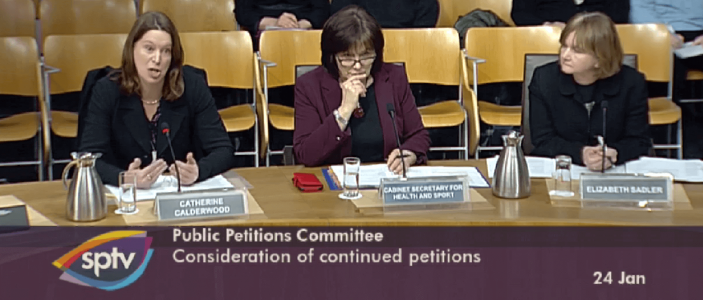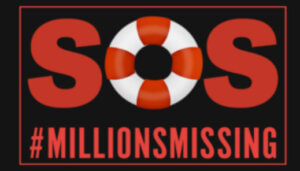Listen to the article:
On 24th January, the Scottish Parliament Public Petitions Committee heard evidence on three continuing petitions, including #MEAction Scotland’s petition: PE1690 Review treatment of people with myalgic encephalomyelitis (ME) in Scotland.
Petition evidence is considered in stages to enable all submissions to be studied. The previous evidence hearing raised a number of questions which the Committee felt should be addressed to the government department responsible for health and medical policy. This meeting provided an opportunity for the Petitions Committee, a cross-party group of MSPs (Members of the Scottish Parliament) to ask questions of the Cabinet Secretary for Health and Sport, Jeane Freeman, MSP. Ms Freeman was joined by Chief Medical Officer for Scotland, Dr Catherine Calderwood, and Deputy Director of the Scottish Government Healthcare Quality and Improvement Directorate, Elizabeth Sadler.
Joining the Petitions Committee members to show their support for the #MEAction Scotland petition and ask questions of Ms Freeman were Mark Ruskell, MSP (Scottish Green Party) and Emma Harper, MSP (Scottish Nationalist Party).
In her opening statement, Ms Freeman thanked the committee for the opportunity to contribute before offering the following assurance to people with ME in Scotland:
“I believe you. I believe that this disease is a life-limiting disease in terms of the quality of your life. I hear what you are saying to us and your experience does matter to me as a Cabinet Secretary”.
Ms Freeman went on to say that she had met with Emma Shorter and Janet Sylvester from #MEAction Scotland the day before and had found the meeting helpful, before touching on her desire to make progress and improve the lives of those people in Scotland living with ME.
Towards the end of her opening statement, Ms Freeman talked about the recent work during the last 18 months on the Scottish Government’s draft Neurological Action Plan (NAP), which received engagement with some in the ME community during its development. This feedback received from people with ME during the development phase was considered during the consultation process. The draft NAP is now itself undergoing a consultation process, which remains open until 8th February 2019. Read #MEAction Scotland submission on the draft Neurological Action Plan here.
[maxbutton id=”21″ url=”https://www.scottishparliament.tv/meeting/public-petitions-committee-january-24-2019″ text=”Watch the meeting ” ]
Committee convenor, Johann Lamont, then asked Ms Freeman if, given the lack of data on the numbers of people with ME in Scotland and the lack of understanding among neurologists, the NAP could be considered to be relevant to people with ME. Ms Freeman explained that the NAP is not condition-specific but rather a set of general recommendations to improve the lives of those living with neurological conditions. She called on the ME community to contribute to the consultation on the draft action plan, while conceding that there may be more the Scottish Government could do to address the lack of data. Ms Sadler also recognised that the data is incomplete and didn’t include people with ME. However, there was, she said, a specific commitment in the NAP to improving the scope of the data.
Deputy convenor, Angus Macdonald, MSP asked if the Scottish Government would provide funding for a patient-led, national ME strategy to address the issues raised by the petition and the evidence submitted in response to it. Although she did not offer any firm commitment to such a strategy, Ms Freeman did confirm, when further questioned by Mr Macdonald, that she was not ruling out such a strategy, stressing the value of lived experience.
Brian Whittle, MSP asked Ms Freeman if she would consider suspending recommendations for CBT/GET, which are still being offered within some Scottish health board areas. Ms Freeman referred the question to Dr Calderwood, whose answer drew on her own early clinical experience. There was, she suggested, evidence to suggest that CBT/GET could be effective in some cases. However, both Dr Calderwood and Ms Freeman seemed adamant that no patient was, or indeed should be, obliged to accept any treatment which they found to be unhelpful or harmful.
Mr Whittle then asked a series of questions about the failure of large numbers of medical professionals to acknowledge ME as a bona fide medical condition. Dr Calderwood and Ms Freeman asserted that they could not compel medical professionals to believe something, and assured Whittle that ME was recognised by the WHO, the Scottish Government and NHS Scotland. There was agreement between Dr Calderwood and Ms Freeman that patients are entitled to expect care and support, regardless of the opinions of their clinicians.
By this point in the proceedings, time was running short, so the convenor asked for last questions and comments. Ms Sadler highlighted the GP training module on ME currently that NHS Education for Scotland plans to develop and Dr Calderwood outlined the working group on ME which the Scottish Government is proposing to set up. The remit of this group remains to be defined. Emma Harper, MSP drew attention to the fact that the #MEdebate was taking place in the House of Commons at Westminster.
Ms Lamont then concluded the meeting, thanking all those who had provided submissions to the committee. The committee has now invited the petitioner and other interested parties to respond to the answers given by the Cabinet Secretary and other panel members. Brian Whittle wished to put on record his belief that there are “some very specific actions government can take to cover that [the denial of ME’s existence by some medical practitioners] and his desire to look at ‘what we as a committee can do to help facilitate or push that along.” The committee will also write to the Scottish Government regarding the role of the clinical nurse specialist in the treatment of ME. This is a role the Government describes as ‘pivotal’ and yet there is only one such post in Scotland.
#MEAction Scotland are reviewing the responses from Jeane Freeman, Catherine Calderwood and Elizabeth Sadler. We will submit a response, challenging some of the points made and asking for clarification on specific issues.
We would encourage people with ME who have been obliged to undertake CBT/GET in order to access services, to submit evidence to the Committee. Written submissions or queries about how to submit evidence should be sent to petitions@parliament.scot.
We will approach academics and researchers to encourage them to submit evidence about CBT/GET and the problems with PACE. In particular, we would like them to provide evidence refuting that CBT/GET should be continued.





